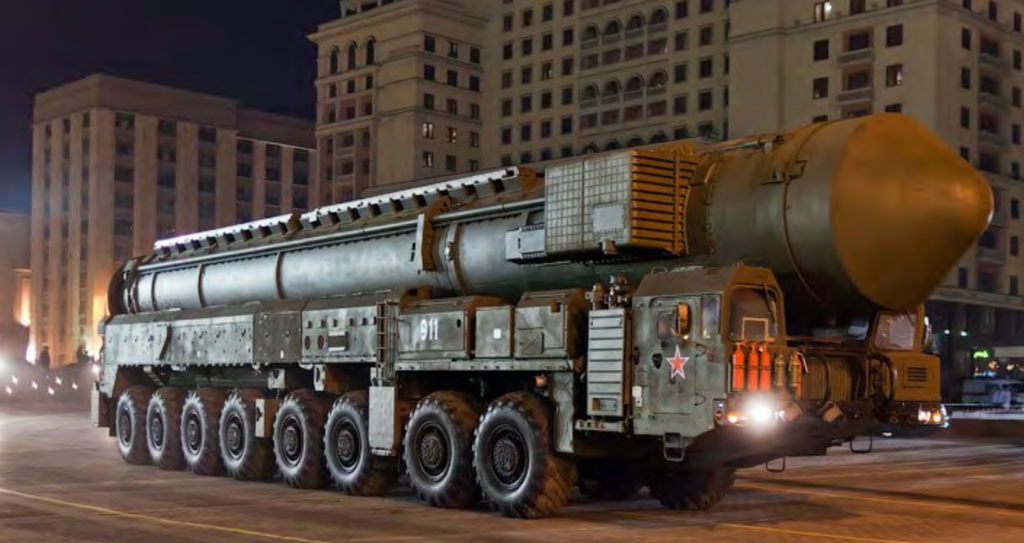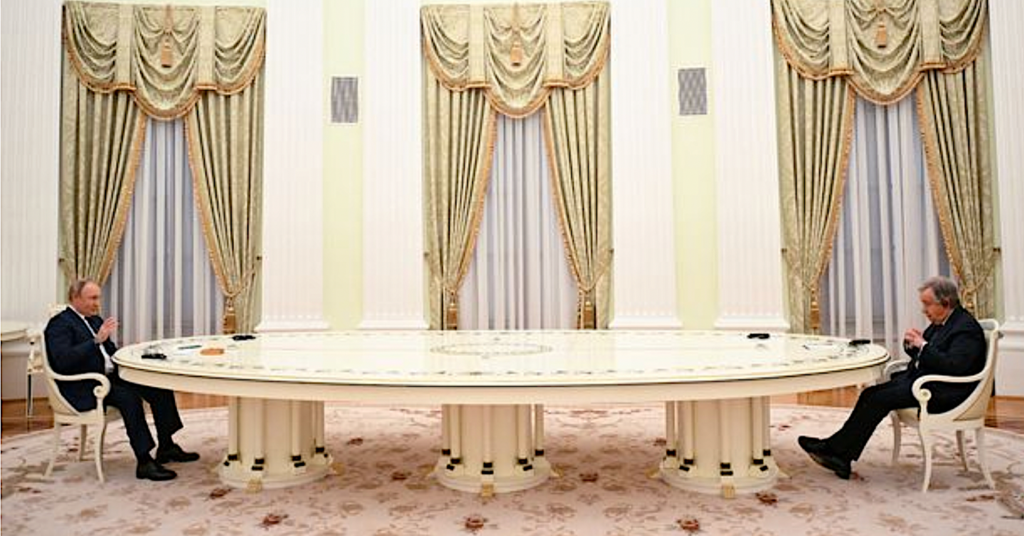Licorne nuclear test, 1971, French Polynesia © CBTO
As the scope and ferocity of the Ukraine war unfold, concerns are deepening over how to effectively prevent escalation. Today, politicians refer to the possibility of a nuclear war, either as a blatant (strategic) threat or out of serious concern. In this respect, it is crucial to bear in mind that wars are not simply accompanied by interpretations; they are driven by them. The way we interpret events contributes to their dynamics. Interpretations can have an impact on the readiness to escalate.
If we are to counteract this dynamic, maintaining a reflected perspective is vital. There are different levels of interpretation in the understanding of any war. Furthermore, there is one line of interpretation that spurs an escalation on both sides. The readiness to deploy weapons of mass destruction is fuelled by a specific concept of the enemy.
THREE LEVELS OF INTERPRETATION
There are at least three dimensions to the understanding of war. Each dimension entails specific reasons that may underpin warfare.
1) The economic level:
Strong economic ties between states have the potential to secure peace, as long as there is mutual benefit. Economic ties rely on a practice of mutual recognition. In the recent past, it was assumed – somewhat naively, as we can see more clearly today – that economic interdependencies could give rise to a deepened awareness of the freedom of the individual, and thus ultimately to a political evolution. Especially in Germany there was much talk of “change through trade”.

Yet at the same time, expansive economic dynamics can trigger wars – not to mention the fact that war itself is an economic factor. This expansive dynamic is inherent in economic activity, since this activity not only serves to provide for vital needs but is imbued with a concept of the ‘good life’ (‘lifestyle’). Securing a constant supply of scarce goods becomes increasingly difficult due to an unbridled refinement and multiplication of artificial needs. Ukraine is a country immensely rich in both food and raw materials, and its shores are a gateway to the world. Because of these factors, Ukraine lies in the focus of other actors pursuing their own economic interests. For instance, it has been emphasised recently that the Russian invasion was in fact a gigantic heist.
However, economic utility calculations are not the sole reason shaping international relations. Antagonisms emerge from deeper political causes to which even economic considerations are subordinated. Thus, both Europe and Russia are currently willing to endure the mutually detrimental consequences of Russia’s economic isolation.
2) The geostrategic level:
This concerns the ways and means of sustaining a political community’s sovereignty in relation to other actors. On this level, there is a constant trial of strength between political systems.[1] The bilateral showdown between Russia and the Ukraine is simultaneously the arena for a multilateral showdown between NATO and Russia.

From a “Western” perspective, the issue is to defend the democratic order against imperialistic despotism. After the invasion of the Ukraine, NATO again appears as the only real guarantor of European defence (which poses a real challenge for the further development of Europe’s strategic autonomy in military terms). In Moscow’s view, it is about defending the multipolar world order against an advancing global hegemony of “the West” led by the USA. Above all, Russia perceived NATO’s eastward expansion as a major geostrategic provocation. The Russian elites believe that the recognition of their country as a global superpower, which is widely denied by the Western world, must be fought for.
These geostrategic perspectives therefore also open the way to sophistry and propaganda. Any aggressive war can be reinterpreted as a war of defence.
3) Consciousness of freedom:
Political systems, in turn, are inspired by basic orientations of the concept of freedom. This is the civilisational-cultural dimension (which is often ignored in the West out of the fear of invoking a “clash of civilisations”). From a Western perspective the modern interpretation of freedom, which acknowledges a right of subjectivity or individuality[2], stands opposed to a pre-Enlightenment mindset that instead embraces a subordination of the individual to the collective. It is significant in this context that Russia – despite its long-standing Christian tradition that gave rise to world-class cultural achievements (especially in poetry and music) – is geographically located predominantly in Asia. From the Russian point of view, the West places a one-sided emphasis on the right of individuality, leading to a fragmentation and atomisation, which ultimately dissolves all moral order based on universal obligations. This is the “westernisation” that Russia wants to avoid. In this sense, the Kremlin explicitly invoked the defence of cultural sovereignty as the goal of its security doctrine last summer. Ukraine seems to be indeed the theatre of a showdown between “the West” and Russia.

UNDERSTANDING DOES NOT EQUAL PERSPECTIVISM
Before we turn to the problematic perspective, we need to consider the following: To acknowledge different perspectives of interpretation does not mean to level out clear differences. In view of the war in Ukraine, we can at least establish two differences of this kind: First, the strategic culture of despotisms and republics differs.[3] The readiness to risk the lives of their own citizens is more inhibited in republics. Most of the NATO member states are democracies. Secondly, it is true that the “West” faces many issues arising from a one-sided understanding of the right of subjective freedom in the understanding of law and the state. Nonetheless, the basic orientation that facilitates democratic republics – namely the consciousness that human beings are free as human beings and that political order has to be sustained by participation – is a more concrete consciousness of freedom than that realised in a despotic collectivism. This difference in the consciousness of freedom shows itself in the heroic resistance of the Ukrainians against a superior, but poorly motivated opponent. This reminds us of the source of national defence: the will to selfhood. The fighting morale is fed by the conviction to stand up for a principle of freedom that is justified in itself. This gave Europe’s “post-heroic society” (H. Münkler) something to think about.
THE MORALIZING VIEW…
All these antagonisms permeate the individuals involved. It is thus understandable – especially in view of Russian war crimes – that the events in Ukraine are viewed from a moralizing perspective as a struggle of good against evil.[4] What holds true for the actions of the individual is projected onto entire nations: here the realm of light, there the realm of darkness. This perspective, however, is not appropriate to historical processes since morality is only the individual’s relationship to his or her disposition. Historical movements that encompass entire states and nations cannot be fully understood by means of these categories. World-historical processes revolve around something that is prior to individual moral consciousness, namely differences within the consciousness of freedom, confrontations between more concrete and more abstract interpretations of freedom.

…GIVES RISE TO THE ABSOLUTE ENEMY
The moralizing view is also a means of propaganda, because it gives rise to the fanaticism of hatred directed at an ‘absolute enemy’[5] of humanity and civilisation whom one not only refuses to understand, but also denies the status of even being human. This undermines the achievements of the regulation of war under international law (the ius in bello, for instance, the distinction between combatants and non-combatants) and creates a willingness to commit atrocities, even wars of extinction.
Hence, there is a connection between the moralizing perspective and the progress of weapons technology: The greater the destructive potential of weapons systems, the more you need an absolute enemy against which deploy them. Weapons of mass destruction are used only against an absolute enemy.[6]
Given the dynamics of war, we should ask ourselves – irrespective of the above-mentioned differences in the concept of freedom – how does the “West” contribute to the creation of an ‘absolute enemy’? Is it justified to demonstrate hostility towards Russians by implying they share collective guilt? The opposite tendency to the creation of an absolute enemy are incentives to engage in dialogue, such as the visit of the UN Secretary General to President Putin. As futile as these impulses may appear on the surface, they bear inherent merit in that they imply a basic recognition of the other as a human being.

WILL TO COEXISTENCE OR UNBRIDLED WILL TO POWER?
The situation seems to be aporetic. Ukraine is oriented towards the Western principle of freedom out of an inner drive and not because of anti-Russian intrigues of external actors, as Moscow suggests. The western world cannot therefore abandon Ukraine. Thus, the “West” justifiably refrains from a policy of appeasement towards Russia. Pacifism must not ignore that true peace can only be a just peace, a peace expressing a correspondence between the actual consciousness of freedom and the political order. This is worth fighting for. In addition, the only way to set limits to a despotically organised aggressor state, as one can learn from Aristotle, is through force.
But Russia is not a country like North Korea. Isolation policy must take this into account appropriately, if only for geostrategic reasons. Radical isolation, which also cuts diplomatic ties, threatens to cement despotism in Russia – even for a post-Putin era. And it strengthens the ties between Russia and Asia, especially with China. Russia is the largest country on earth which – probably not only from the point of view of its elites – has to fight for its recognition in a multipolar world order.[7]
It is crucial to bear in mind that this war manifests a deeply rooted problem in the world order that has been latent ever since the fall of the Soviet Union: Is it possible to (re-)establish a world order involving a rule-based coexistence of the “Western world” and Russia? Diplomatic initiatives that lack an understanding of this issue are doomed to fail.
Objections to this are obvious: What is the point in diplomatic initiatives if Russia aims to compensate its presumed lack of weight within the world order by a belligerent imperialism? Why should the “West” unilaterally engage in serious diplomacy as long as Russian propaganda is systematically fostering absolute enmity? Furthermore, no politician wants to be considered weak, especially in times of war. If both sides lack the will to look at their actions through the eyes of the other – which has traditionally been a strength of diplomacy in Europe as a “peace power” – , what will remain dominant is a ‘will to power’ which tends to dehumanise the other.
What can be done to de-escalate? Those siren voices that – out of short-sighted calculation – stir up absolute enmity on both sides should be met with caution. We should not lose the willingness to reflect on the mentioned levels of interpretation, nor the willingness to look at one’s own actions through the eyes of the other. This attitude is the prerequisite to work towards a peaceful coexistence once again.
Ass.-Prof. DDr. Max Gottschlich
Department of Practical Philosophy/Ethics
Catholic Private University Linz
Footnotes:
A classic example are the Greco-Persian wars, which the Greek side interpreted as a struggle of a more concrete principle of freedom against an Asian despotism.
2 This refers to the core of classical liberalism (John Locke): the individual has the right, even with regard to the state, to choose her or his own welfare and ‘pursuit of happiness’.
3 Kant has demonstrated this in his essay on “Perpetual Peace”.
4 Luhmann emphasized the ‘polemogenic’ nature of a moralizing attitude towards the other. However, true morality (in Kant’s sense) is to be distinguished from mere moralizing.
5 A phrase coined by Carl Schmitt in the “Theory of the Partisan”.
6 This idea is examined in more detail by Carl Schmitt in his “Theory of the Partisan”.
7 This has been recently emphasized by Tatiana Stanovaya in https://foreignpolicy.com/2022/06/01/putin-war-ukraine-west-misconceptions.

